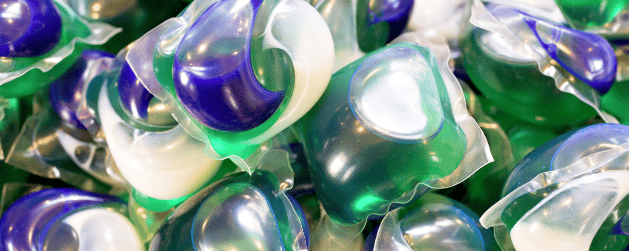- The Column
- Posts
- 🏭 Silicon for everyone
🏭 Silicon for everyone
SK Capital’s pod film acquisition, Shin-Etsu’s silicon investment plan, and ping pong balls.
TOGETHER WITH
Good morning. Are you familiar with how force majeures are communicated? I’m wondering whether the communication is made public anywhere (i.e. when it’s not communicated via press release, is it ever disclosed elsewhere via some regulatory/legal or financial filing requirement?).
From the condenser:
· SK Capital’s pod film acquisition
· Shin-Etsu’s silicon investment plan
· POTD: ping pong balls

SK Capital bought part of a pod film maker
US-based private equity (PE) firm, SK Capital, bought a majority stake in Italy-based polyvinyl alcohol (PVOH) film producer, Ecopol, for an undisclosed sum.
A little context:
We’ve talked about laundry pods a few times in the past, but so far the focus has just been on what’s inside the pod (detergent)—Ecopol’s core product, PVOH films, are the biodegradable and water soluble polymers used to encapsulate that detergent. Those PVOH films are made of PVOH, which is made via the hydrolysis of polyvinyl acetate, which is made by polymerizing vinyl acetate (VAM)—which we make by reacting ethylene (from ethane or naphtha steam crackers) with oxygen (from the air) and acetic acid (from methanol and carbon monoxide, both from natural gas).
So, what’s the deal here?
Making PVOH films isn’t some revolutionary idea—DuPont patented a film forming process (known as solution casting) for PVOH back in 1944. What’s new here is the application and its growth trajectory: in the same way that powder detergent was replaced with liquid detergent, encapsulated detergent has been taking market share from liquid detergent, and as the technology becomes more widespread (as in, not just a P&G thing) we’ll see even more growth from the folks upstream.
Wait, what about the acquisition?
Prior to this acquisition, Ecopol’s founder and CEO, Mauro Carbone, was the controlling shareholder, but now SK Capital has the reins, so you can expect more US based investment. And that’s in line with Ecopol’s most recent move: they just announced a $38 million site planned for the US southeast in Griffin, Georgia (their first investment in the US).
SPONSORED
Meet your low carbon market research tool
If you’ve ever sifted through an earnings presentation or transcript, you know how time consuming it can be to extract the meaningful data. And if you’ve ever needed to keep tabs on an entire industry, or do deep market research, then you know how it can quickly become an impossible task.
With Betamark, you can easily search through earnings presentations and calls from the Energy, Mining, Chemicals, and Materials sectors, and get the data you need at a glance—even pricing data for commodities and carbon!

Shin-Etsu is doubling down in silicones
Japanese chemical company, Shin-Etsu, announced plans to invest some $700+ million in silicone capacity expansions across many of it sites.
Some context:
Shin-Etsu may be steeped in the vinyl business and have its beginnings in fertilizers, but the company today is probably most well known for operations along the silicon value chain. And while that does include electronic and semiconductor materials, it also includes silicone rubbers like LSR and HCR, which are both made by curing a polysiloxane like polydimethylsiloxane (PDMS)—which, for example, is made by the reaction of dimethyldichlorosilane and water, and that dimethyldichlorosilane is made by passing methyl chloride over some ground-up silicon, which is made by heating up sand.
So… expansions?
The press release is fairly generic—it basically just outlines a capital allocation plan that includes, but isn’t limited to: investment at their “main silicones production hub in Japan”, located in Gunma, but also their smaller sites in Niigata and Fukui, as well as their site in Thailand that produces the feedstocks for those sites (the chemicals and materials listed above) and their other plants in Asia, the US, and Hungary.
Zooming out:
There’s a lot of room for growth even with the secular semiconductor trend out of the picture. We’ve already talked about Shin-Etsu’s new silicone coatings for EV wires (a new application is born) and their silicone-based cardboard coating (an application is replaced).
Some more headlines
BASF's CEO is saying that they aren't considering any more plant closures in Europe
Chemours is closing one of its titanium dioxide plants in Taiwan
Dow Chemical declared a force majeure after a fire at its EO site in Plaquemine, Louisiana
BP and OMV signed a 10 year LNG supply agreement
Wood Mackenzie thinks that Indonesia should lean into its oil and gas sector
Product of The Day
Today, we're breaking down ping pong balls.

Prior to 2014, you would be hard pressed to find ping pong balls made of anything but a material called celluloid. Made by mixing nitrocellulose (from nitric acid, sulfuric acid, and cellulose) and camphor (from camphor basil or turpentine), celluloid was outlawed by the International Table Tennis Federation (ITTF) because of its flammable nature.
As of 2020, there were no celluloid ping pong producers remaining. Today, basically all ping pong balls are made by molding sheets of a terpolymer called acrylonitrile butadiene styrene (ABS). We've talked about ABS capacity expansion announcements and plants starting up.
The reboiler
Article: Oleochemicals are making a comeback because of the sustainability push. Give this a read if you want some context.
Podcast: Check out this episode featuring Dr. Anders Hallsby on water treatment technologies and trends.
The bottoms

Want to discuss this stuff with other readers? Join the Discord.
Interested in working for a startup? Join the talent pool.
Looking for older editions? Read the archive.
Curious about more than just news? Subscribe to Feedstockland.


Reply